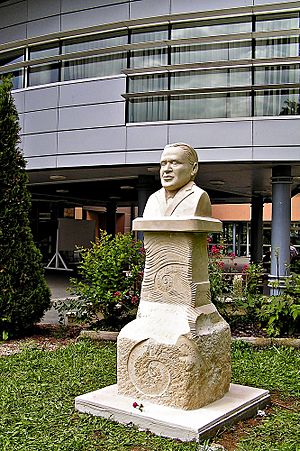Jean Hyppolite facts for kids
Quick facts for kids
Jean Hyppolite
|
|
|---|---|

Bust of Jean Hyppolite by Jean-Marie Meslin
|
|
| Born | 8 January 1907 Jonzac, France
|
| Died | October 26, 1968 (aged 61) Paris, France
|
| Alma mater | École Normale Supérieure |
| Era | 20th-century philosophy |
| Region | Western philosophy |
| School | Continental philosophy |
|
Main interests
|
History of philosophy |
|
Influences
|
|
|
Influenced
|
|
Jean Hyppolite (born January 8, 1907 – died October 26, 1968) was an important French philosopher. A philosopher is someone who studies big questions about life, knowledge, values, and reality. Hyppolite was especially known for helping people understand the ideas of Hegel, a famous German philosopher. He also taught many students who later became very important thinkers in France.
His main books include Genesis and Structure of Hegel's Phenomenology of Spirit and Studies on Marx and Hegel.
Contents
A Young Philosopher's Journey
Jean Hyppolite was born in a town called Jonzac in France. He went to a very famous French school called the École Normale Supérieure (ENS). Another well-known philosopher, Jean-Paul Sartre, was at the same school around the same time.
After finishing school, Hyppolite became very interested in the ideas of Hegel. To truly understand Hegel's main book, Phenomenology of Spirit, Hyppolite taught himself German. This way, he could read the book in its original language.
In 1939, he published his own French translation of Hegel's book. Later, in 1947, his detailed notes and explanations of Hegel's work became a book called Genesis and Structure of the Phenomenology of Spirit. This book helped many people understand Hegel's complex ideas.
Teaching and New Ideas
After World War II, Hyppolite became a professor at the University of Strasbourg. Then, in 1949, he moved to the famous Sorbonne in Paris to teach.
In 1952, Hyppolite wrote another important book called Logique et existence (Logic and Existence). This book explored deep ideas about language, what it means to exist, and how things are different from each other. These questions became very important for a new way of thinking in French philosophy, sometimes called post-structuralism. The philosopher Gilles Deleuze even wrote a review about this book.
In 1954, Hyppolite became the director of the ENS, the school he had attended. This meant he was in charge of leading this important institution. In 1955, he wrote a study about Karl Marx, another influential thinker. At this time, many French thinkers were very interested in Hegel's ideas.
In 1963, Hyppolite was chosen to join the Collège de France. This is a very respected institution in France where top scholars give lectures. He was given a special position to teach about "The History of Philosophical Thought."
A Teacher's Legacy
While some philosophers like Jean-Paul Sartre created many new ideas, Jean Hyppolite is best remembered for his role as a great teacher, explainer, and translator. He helped many students understand difficult philosophical concepts.
He had a big influence on many thinkers who later became famous themselves. These included Gilles Deleuze, who studied Hegel with Hyppolite, and Michel Foucault. Other students he influenced were Jacques Derrida, Gérard Granel, and Étienne Balibar.
Jean Hyppolite passed away in Paris in 1968.
Works
- Genesis and Structure of Hegel's Phenomenology of Spirit (1947)
- Logic and Existence (1952)
- Studies on Marx and Hegel (1955)
Images for kids
See also
 In Spanish: Jean Hyppolite para niños
In Spanish: Jean Hyppolite para niños
 | Selma Burke |
 | Pauline Powell Burns |
 | Frederick J. Brown |
 | Robert Blackburn |


